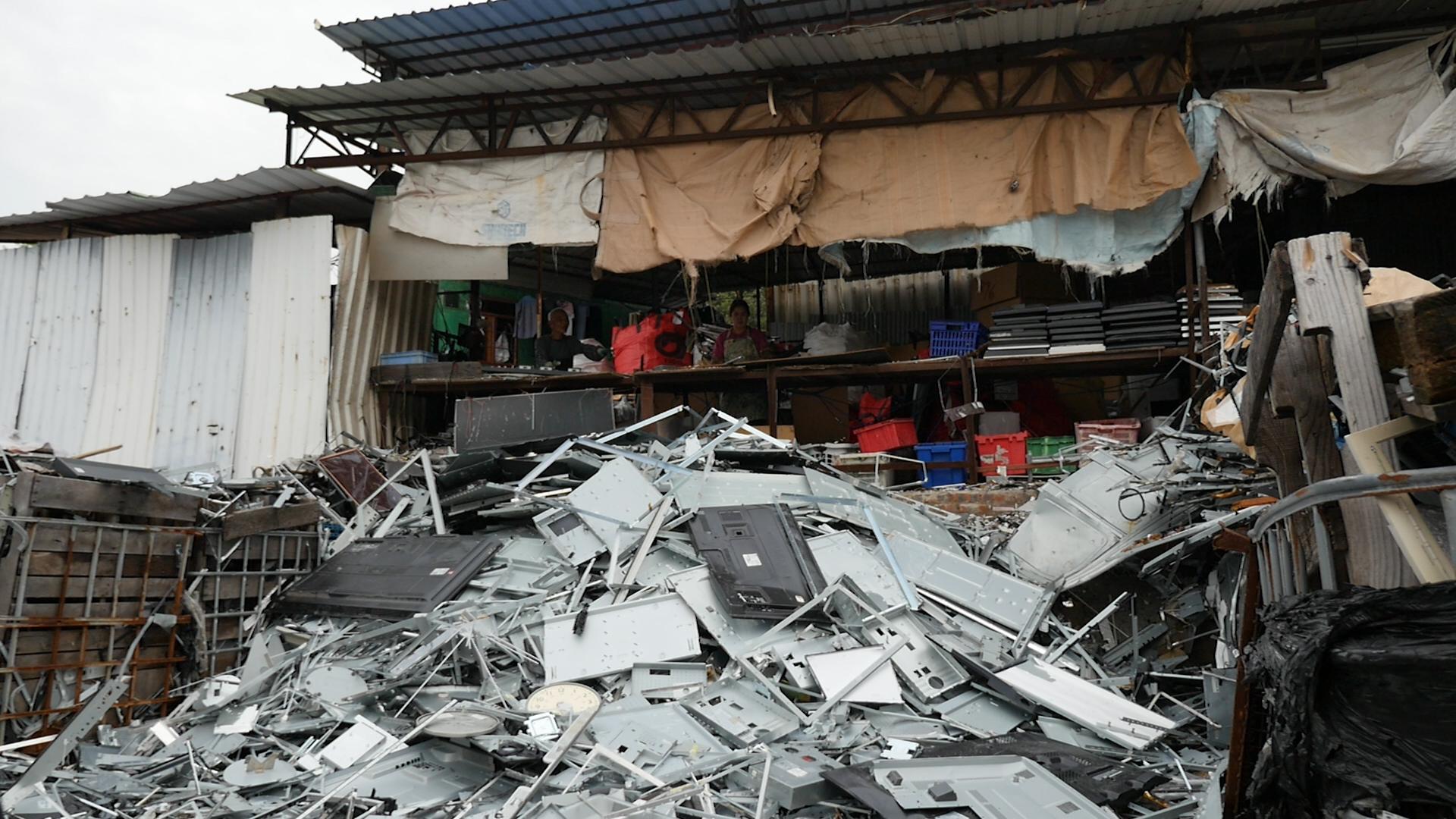
A pile of scraps from dismantled flatscreen televisions sits in front of workers at a junkyard in Hong Kong. Using a GPS location tracker, the environmental group Basel Action Network tracked a television from the Seattle-based recycler Total Reclaim to this junkyard.
Katie Campbell, KCTS9 / EarthFix
The biggest electronic recycling company in Washington faces multiple state investigations and has lost its environmental certification after it was caught secretly exporting televisions laden with hazardous materials to unregulated facilities in Hong Kong.
Seattle-based Total Reclaim, a certified electronics recycler in Oregon and Washington, admitted to withholding information about the exports after the nonprofit Basel Action Network placed GPS tracking devices in flat screen TVs and tracked their journey overseas.
Coming next week: An EarthFix special report on the flow of hazardous electronic waste from the U.S. to the developing world.
The Basel Action Network, also based in Seattle, established the e-Stewards certification, which is now one of two prominent and stringent certifications used by state electronic recycling programs to require proper dismantling of devices and prevent the exporting of whole electronic devices that contain hazardous materials.
Both the Oregon Department of Environmental Quality and the Washington Department of Ecology have launched investigations into whether Total Reclaim violated their state hazardous waste laws.
Oregon regulators have also asked the state Department of Justice to open an investigation into whether Total Reclaim violated consumer protection laws.
The revelation about Total Reclaim delivers a blow to the Northwest electronics recycling industry and casts doubt on the effectiveness of efforts to ensure the safe dismantling of electronics like laptops, TVs and printers, which contain toxic materials like heavy metals and potentially carcinogenic chemicals.
Total Reclaim accounts for more than 50 percent of all electronics recycling in Washington, whose customers include the City of Seattle, King County, Boeing and the University of Washington. It is also one of the larger recyclers operating in Oregon.
Founded in 1991, Total Reclaim specializes in recycling common household items that contain hazardous materials, ranging from laptops and batteries to light bulbs, refrigerators and air conditioners. The company collects, transports, dismantles these items into raw materials like copper, steel or plastic that can be re-sold to manufacturers.
The company declined a request for an interview Thursday and did not respond to written questions about how much of its material was exported and for how long.
In a public statement issued Thursday, co-owners Craig Lorch and Jeff Zirkle cited immense pressure from a difficult business market.
“We lost sight of our values and made business decisions that were contrary to the certifications and standards we had agreed to meet,” the statement read.
Prices for commodities such as copper and plastic have plummeted, labor costs have increased and recyclers like Total Reclaim are locked into long-term, fixed-price contracts, the company said.
“We potentially embarrassed our customers, who were in no way complicit in our actions,” the company said. “In addition, we were not mindful of the environmental and human harm that could have been caused in Hong Kong. For all of this, we are very sorry.”
Total Reclaim was a founding member of the e-Stewards certification and has been an icon for responsible recycling, Basel Action Network founder Jim Puckett said.
“We were certain that export was still taking place across the country, but what was a shock is that it was Total Reclaim,” Puckett said.
Puckett said his organization would revisit ways to ensure compliance with the e-Stewards certification, noting that Total Reclaim is not the only processor his group has caught exporting waste it was supposed to be recycling. But he believes the certification is already quite rigorous.
“Any program can be cheated on. Anybody who says they have a 100-percent perfect program is not being honest,” Puckett said.
Puckett said state agencies need to do more to ensure recyclers can withstand difficult markets and to ensure they comply with recycling standards.
Total Reclaim operations had been previously inspected by state regulators in Oregon and Washington, as well as e-Stewards auditors. Processors like Total Reclaim are also required to report to state-run recycling programs what they do with the waste they receive.
And yet, when tracking devices showed flatscreens sent to Total Reclaim ended up in Hong Kong, everyone was caught off guard.
Miles Kuntz, manager of the E-Cycle program at the Washington Department of Ecology, called the situation “very troubling.”
“It shows there’s no perfect system. We’ve been aware of that,” Kuntz said. “There’s no perfect way to manage somebody handling hazardous waste. If they want to do something differently than what they’re telling you they’re doing, it’s not really, really hard for them to do that, to hide what they’re doing.”
Cassandra Profita contributed reporting.
